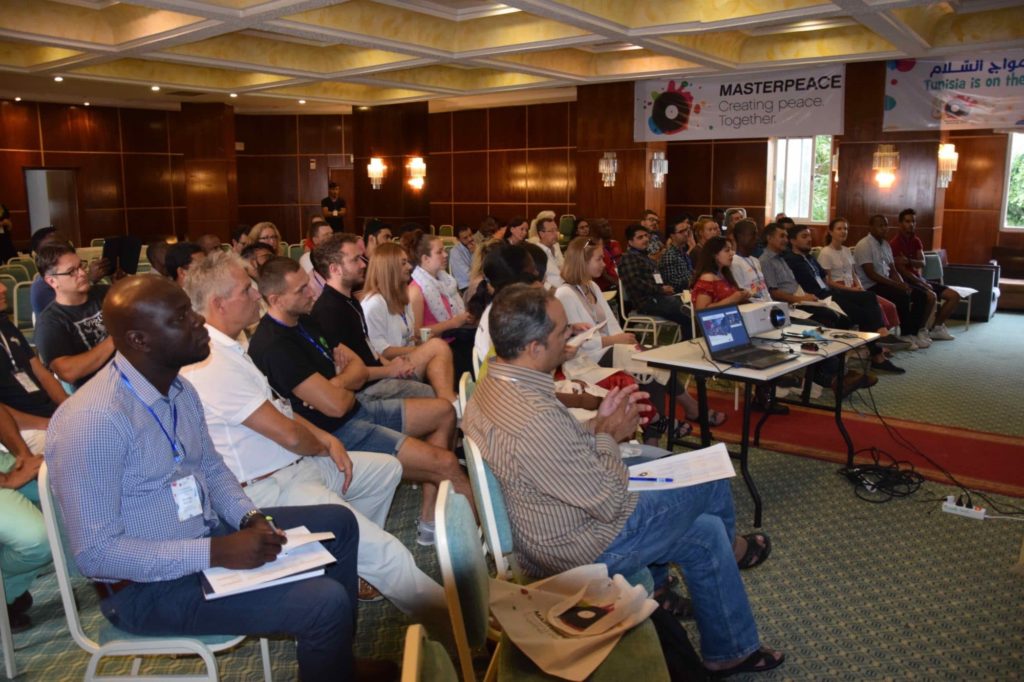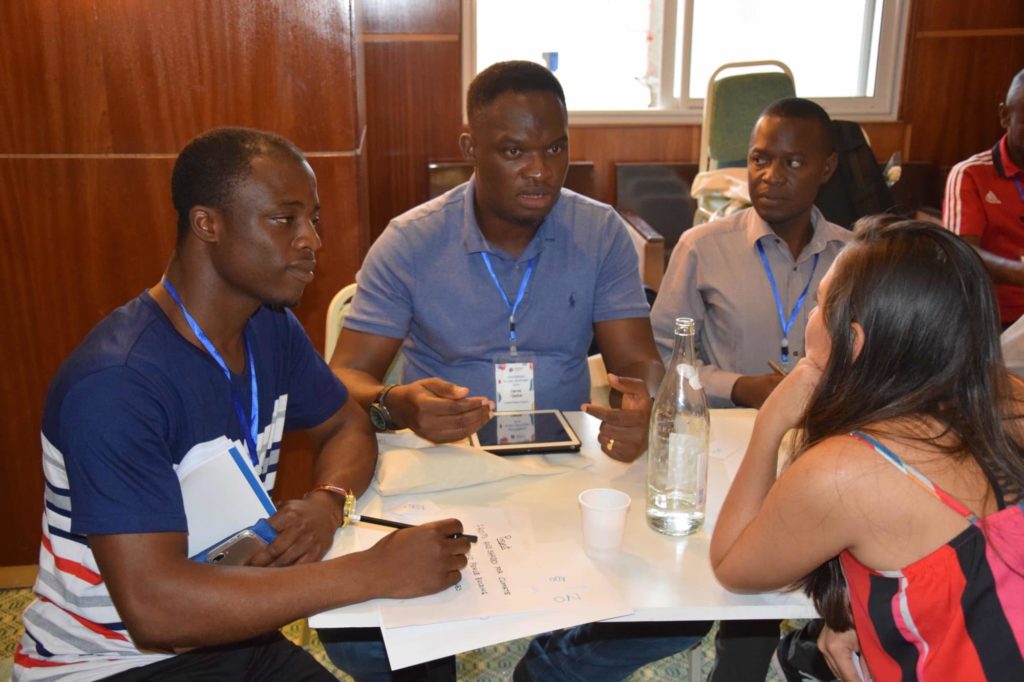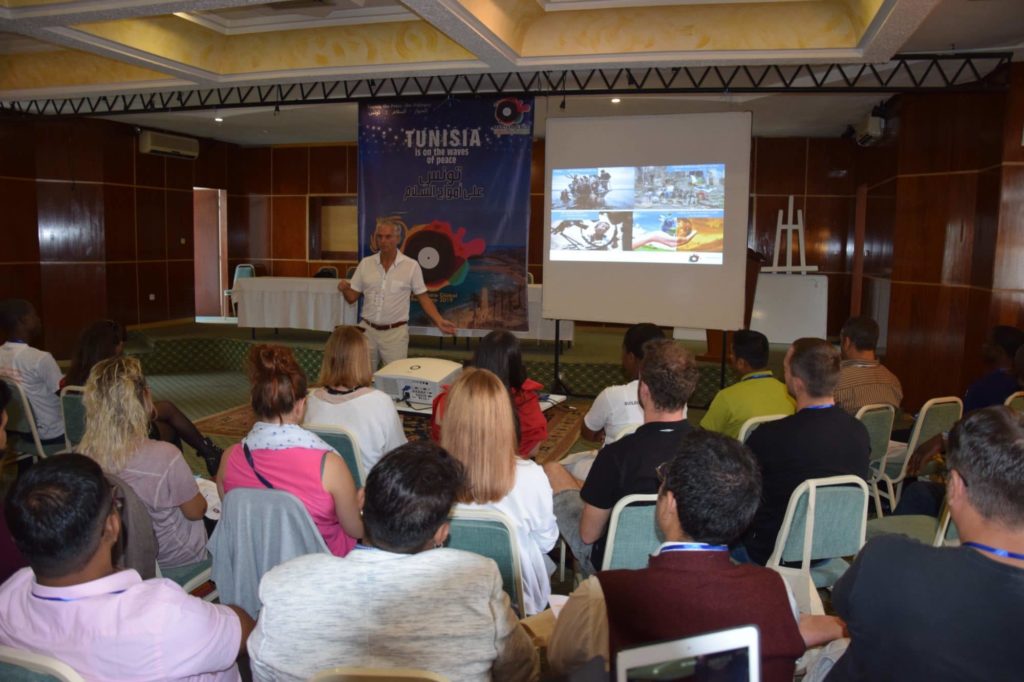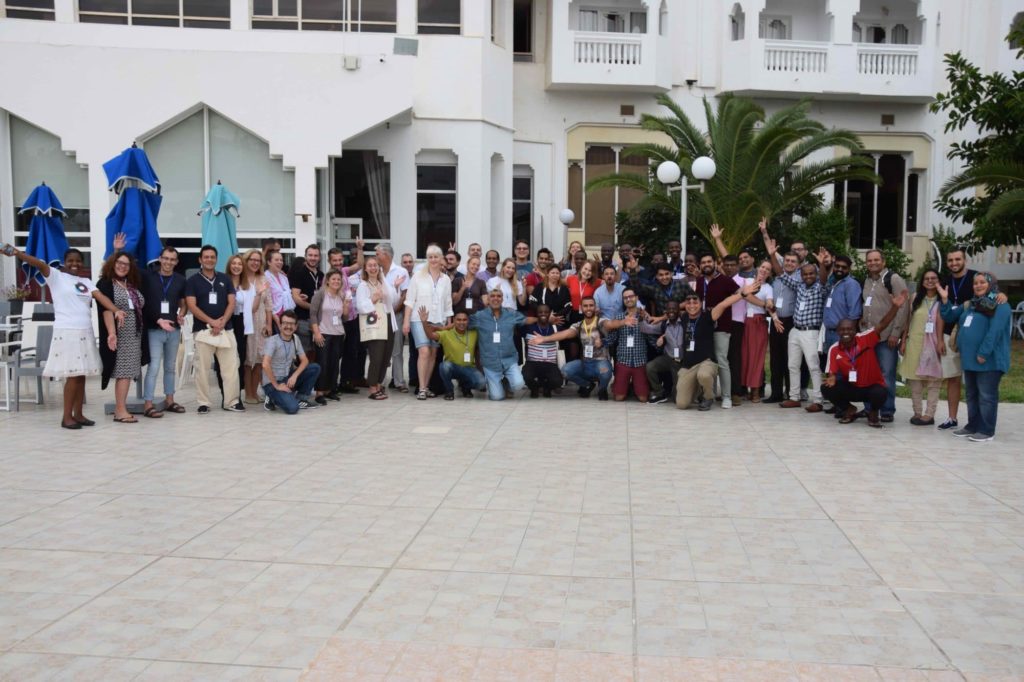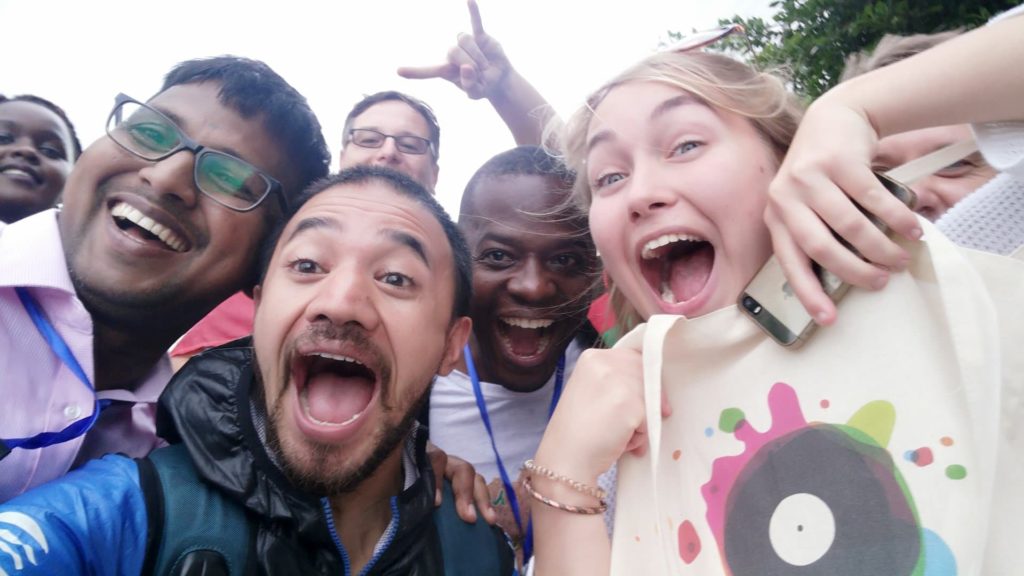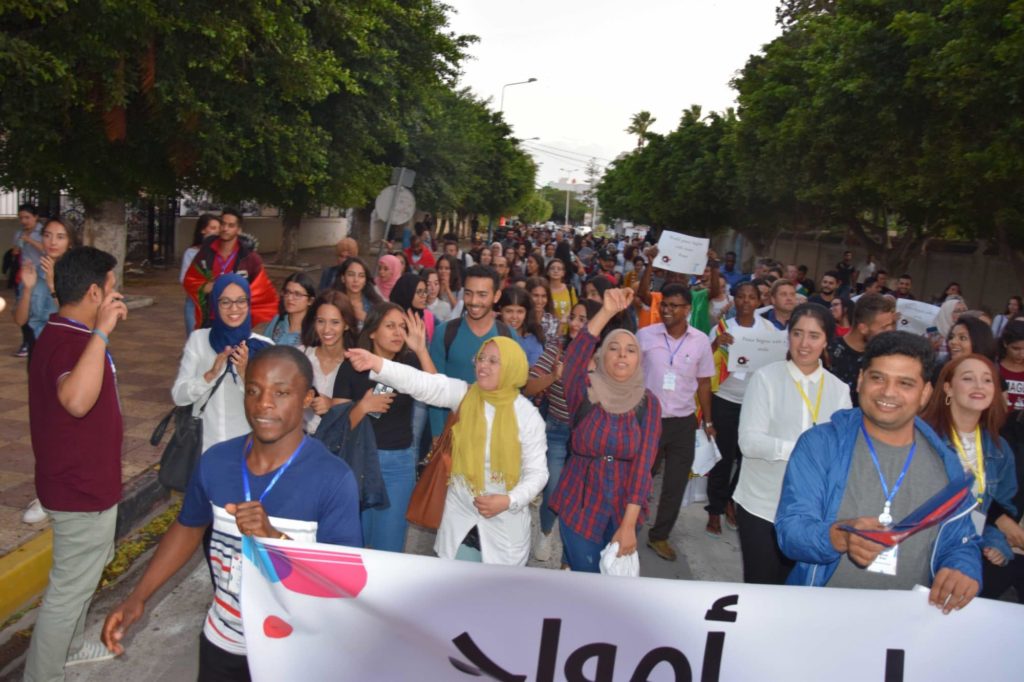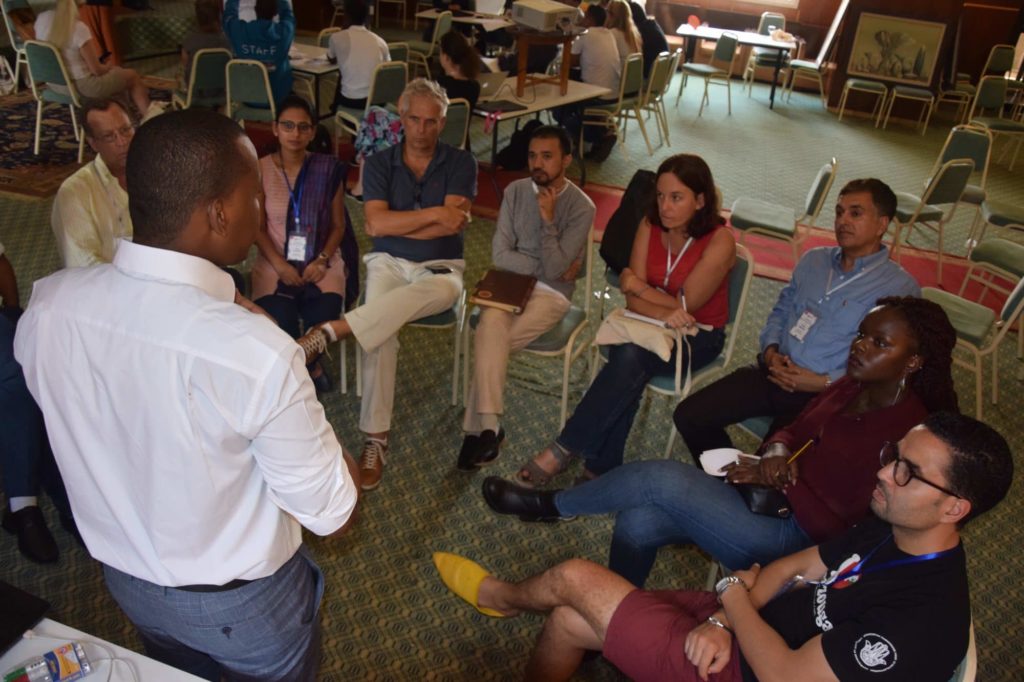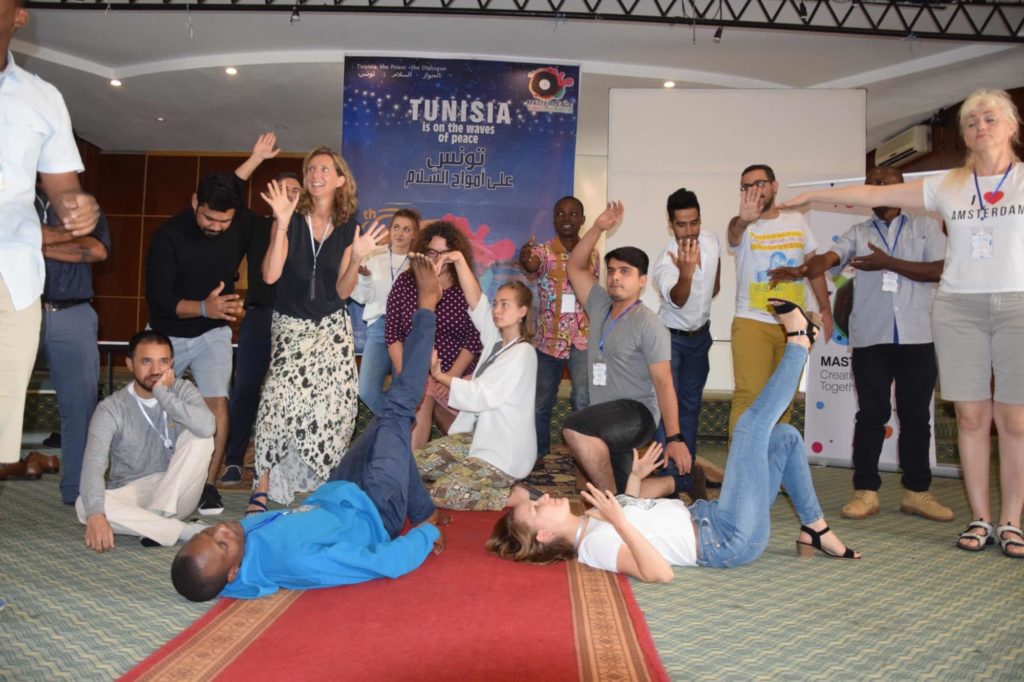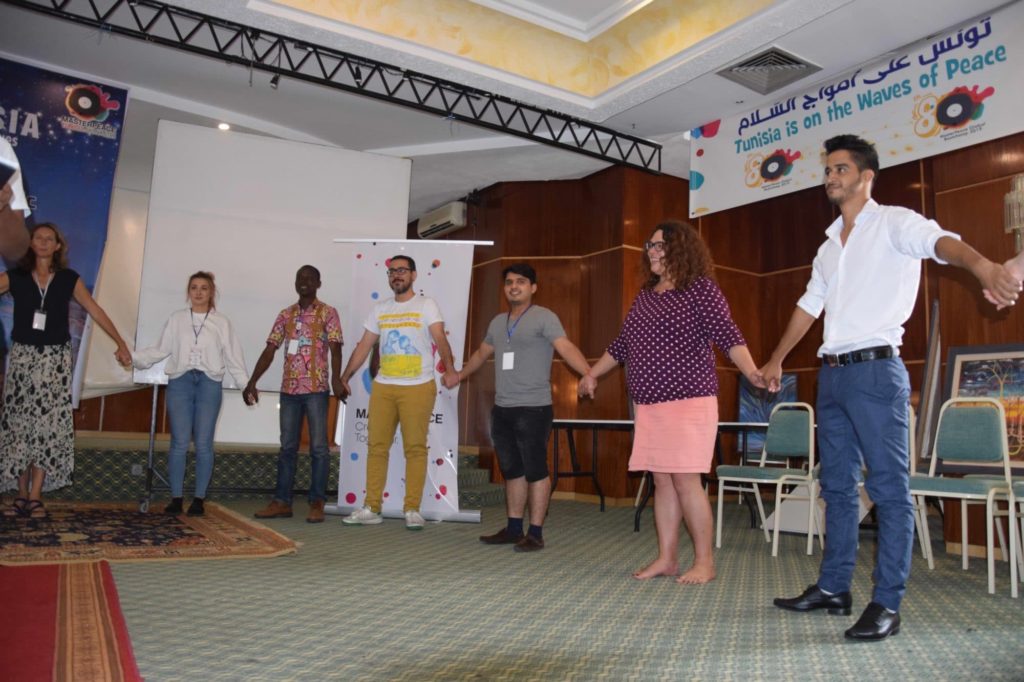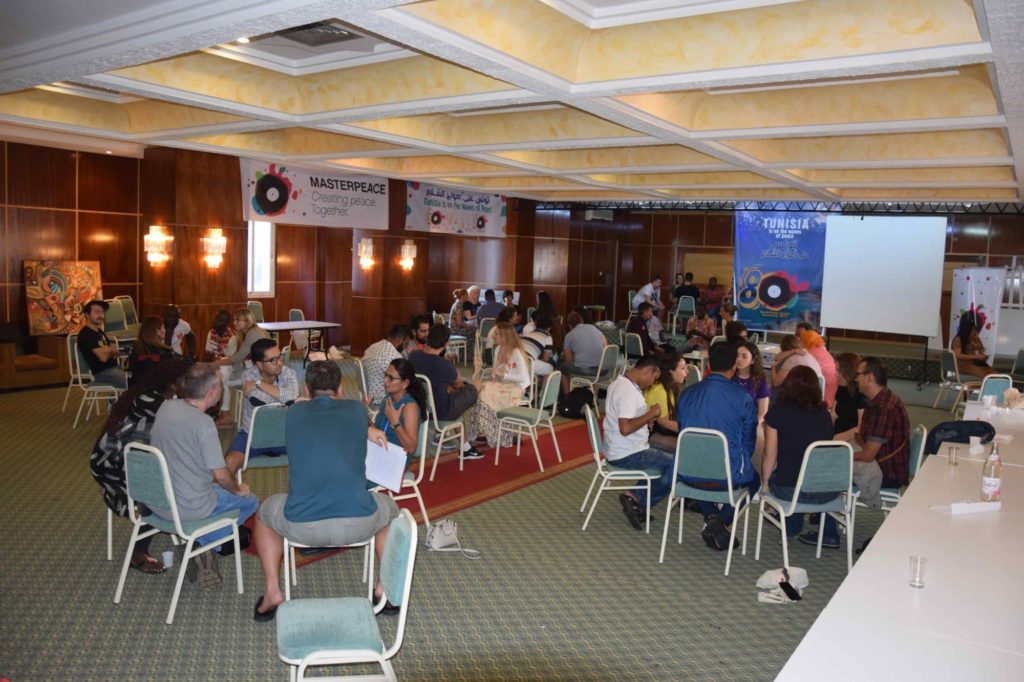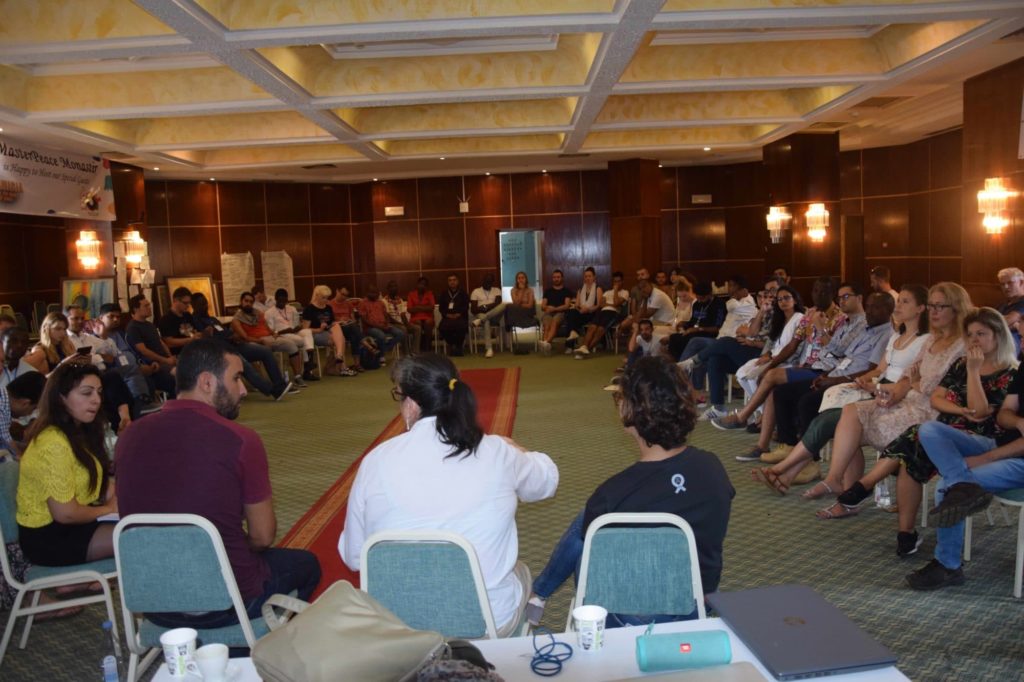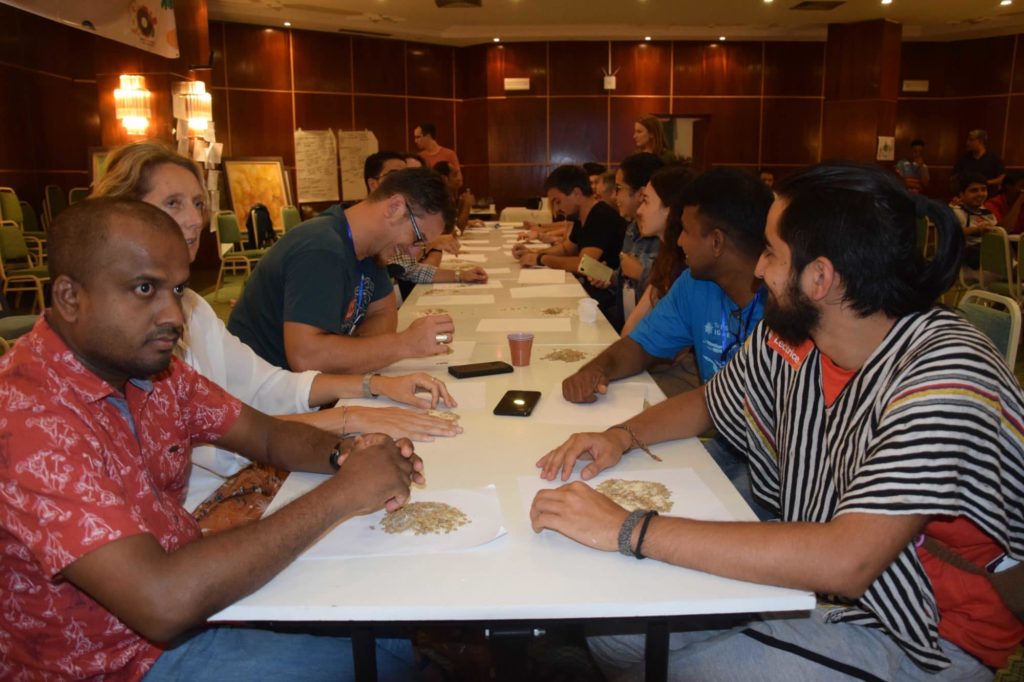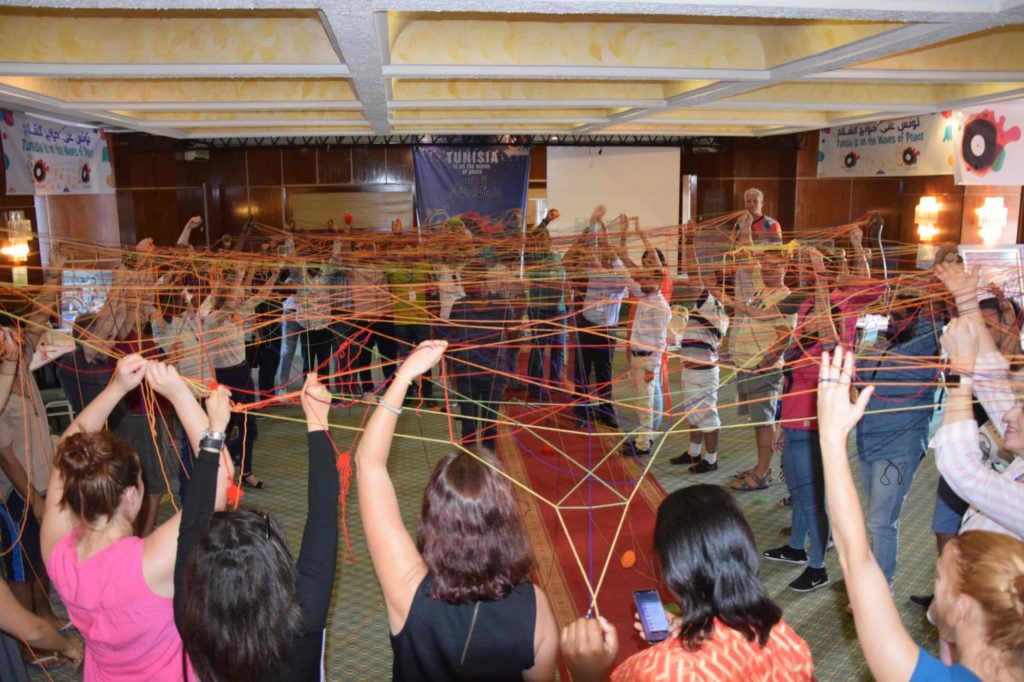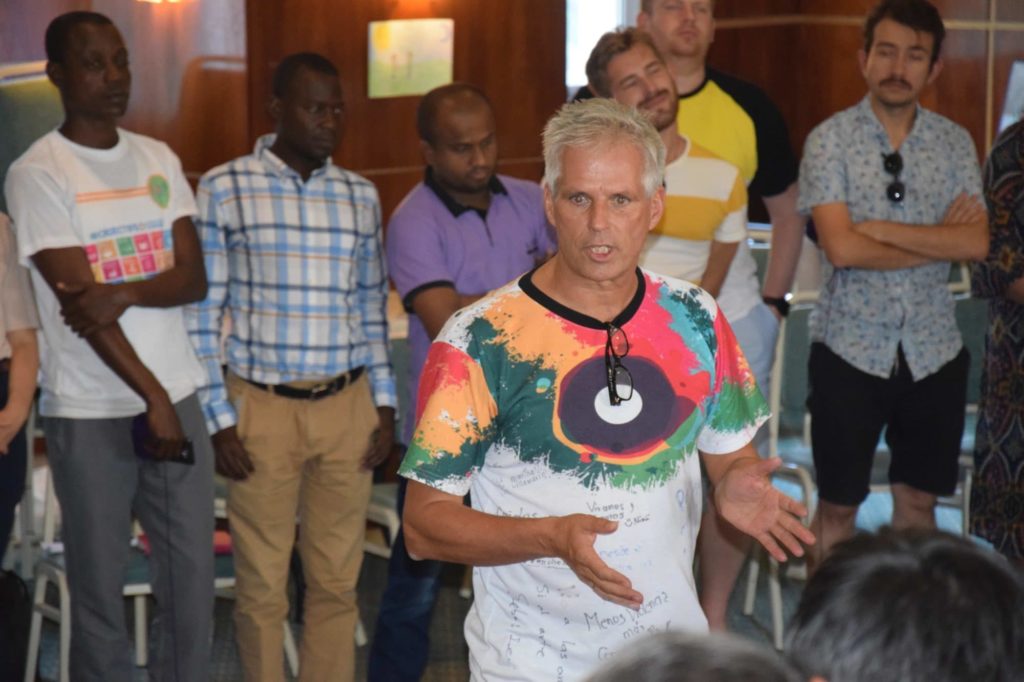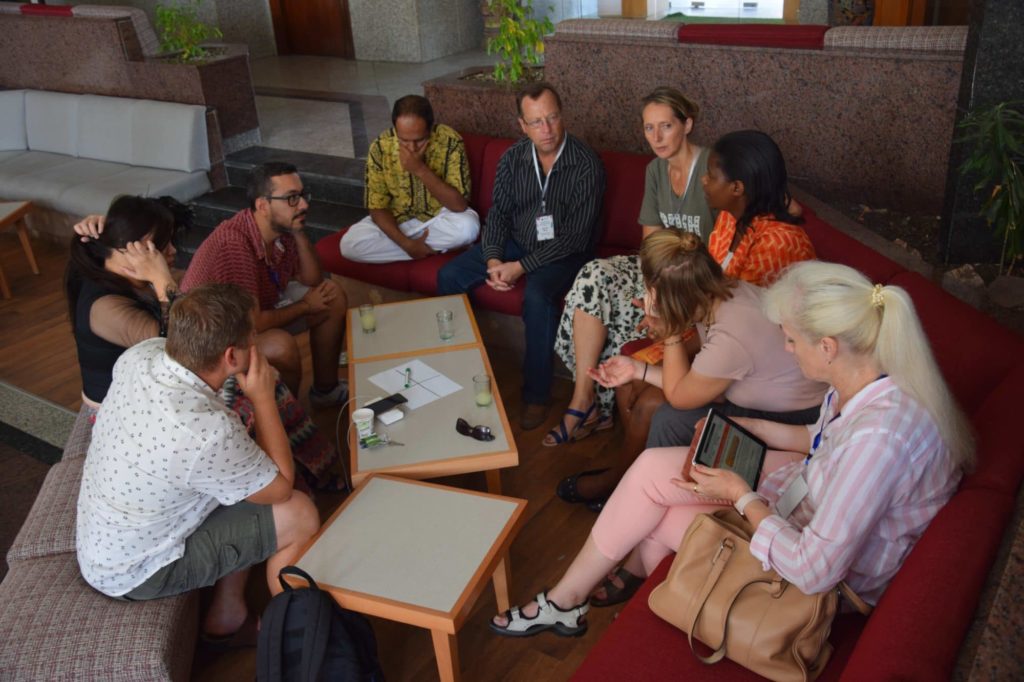MasterPeace Global Bootcamp 2019 sets the new strategic phase of MasterPeace in motion

Tunisia, The Peace - The Dialogue
تونس، السلام - الحوار
MasterPeace organized its 8th edition of the Global Bootcamp in Monastir, Tunisia from 7-11 October 2019, bringing together 62 participants from 54 MasterPeace Clubs representing 38 countries with the main goal to align and strengthen the global peace movement.
Under the theme “Tunisia, The Peace – The Dialogue”, MasterPeace launched its 8th edition of the Global Bootcamp in Tunisia – the movement’s flagship event held every year to bring MasterPeace Club leaders together for few days of intense interactions and discussions for taking the next steps as a global grassroots movement. The event meant translating the strategy of MasterPeace of ‘Creating campaigns, concepts and funding. Together’ into action.
Since its first edition, the MasterPeace Bootcamp has evolved every year from an occasion to meet and catch up towards a meaningful momentum within the movement to strengthen leadership, share best practices and create new partnerships. The event invites MasterPeacers to inspire and be inspired, build personal interconnections and boost professional growth.
The theme of this year was focused on facilitating dialogue, inspired by the Tunisian experience of transitional peace-building through national dialogue, which served as a cross-cutting element throughout the entire event. In addition, the event offered a chance to share the Club leaders’ expertise on several topics related to (digital) storytelling and social entrepreneurship among other concepts, starting from the common ground and knowledge we already possess as a network, and building further from there. Through regional “pressure-cooker” workshops, the Global Bootcamp also presented a crucial opportunity to discuss co-creating concepts and funding opportunities, and design new regional and global campaigns that address (G)local needs.
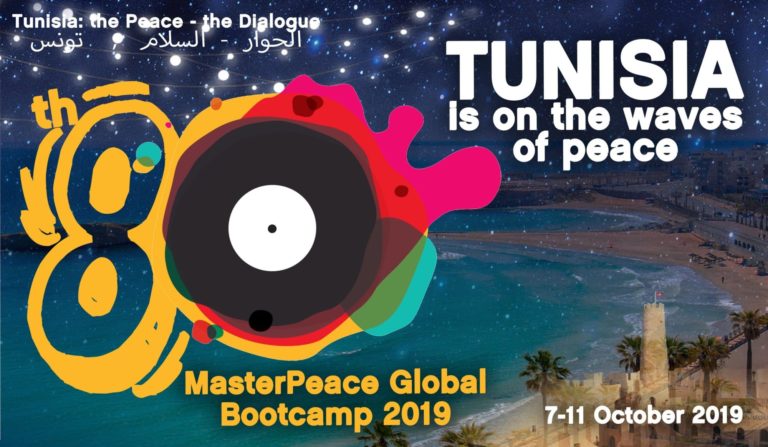
Inspired by the Tunisian Experience
Not far from our venue, in the city of Sidi Bouzid just 185km way, a street vendor called Mohamed Bouazizi set himself on fire on the main square to protest against police action. This happened towards the end of 2010 as an act of despair and anger, reflecting the discontent with the status quo of high rates of unemployment, inflation and corruption. People were demanding freedom. This moment contributed to fuelling the Jasmine Revolution, which started shortly after and ignited a fire that could not be put out across this part of the world.
Regardless of our opinion regarding this beginning, MasterPeace gathered in Tunisia to discuss the results of what came next: reflecting on the power of dialogue, the power of collective national dialogue that brought Tunisia back from the brink. After all, the Norweigan Nobel Committee gave the Nobel Peace Prize to the Tunisian National Dialogue Quartet “for its decisive contribution to the building of a pluralistic democracy in Tunisia in the wake of the Jasmine Revolution of 2011”.
However fragile the civic space may be, our team in Tunisia represented by MasterPeace Monastir had the dream to bring together people from different parts of the world and to give them the experience to “live” through the ‘Tunisian Experience’ at the most unique of times: the Bootcamp took place in parallel with historic parliamentary and presidential elections, engulfing Tunisia with waves of debates and campaigns as it embarks on a new chapter.
Recap Day One – Looking Inward
We started the first day setting the mood of the Bootcamp by welcoming words from Mr. Bechir Selmi, the Club leader of MasterPeace Monastir and the director of the Organization of Youth and Sports. He expressed his personal pride as well as the city’s excitement to host the peace leaders from all these countries by noting that “Only the United Nations and MasterPeace have the power to bring 40 countries into one room!”
During the first day, Aart Bos (Global Leadership at MasterPeace) shared the current status and growth perspectives of the organisation while introducing the upcoming strategy under the framework of ‘Creating campaigns, concepts and funding. Together.’, where the focus lies in creating a regional structure where each Club can support each other and uplift the continent as a whole. MasterPeace piloted several novel concepts during the Bootcamp such as the Idea Bazaar, inspired by the traditional Middle-Eastern market of exchanging, trading and meeting old and new friends. The Bazaar became a buzzling space to trade ideas, pitch projects and create reciprocal inspiration as MasterPeace Clubs presented their top projects and initiatives to each other, where ‘passers-by’ could invest in the Clubs’ ideas by giving them ‘coins’, thereby nominating this idea to the next phase of being presented during the Global Carousels of the upcoming days.
Following the Idea Bazaar, MasterPeace Monastir took the bootcampers to the Health University of Monastir, where the students joined the Bootcamp participants streets for a ‘Walk of Peace’, touring the city of Monastir with their flags in a symbol of bringing the world to Monastir and bringing Monastir to the world. The Peace Walk was a catalysing moment where the different stakeholders came together for this unique celebration. The streets were filled with civil society partners, youth institutions, local education associations and the youngsters of Monastir and Tunisia. Although the invitation came from the students of the university, it quickly grew into a movement within the city of Monastir involving the active civil society, pulling together hundreds of people who marched together with our MasterPeace leaders.
Next to that, MasterPeace piloted two more ‘new’ practices. The first one, ‘Cleaning the House’ was inspired by the workshops carried out by infamous performance artist Marina Abramović and set up at the Bootcamp with the intention to help the participants clean the ‘inner house’ and expand the physical limits as well as mental potentials through unique and tested techniques. Second to that, MasterPeace also rolled out the ‘Home Group’ concept that helped establishing strong bonders within the big group, as small ‘families’ came together at the end of each day to share their most important moments – both energy-boosting and energy-draining – in a safe and compassionate space.
Recap Day Two – Slow Down To Move Faster
The day started with a creative ‘ACT! Together’ session where participants were asked to get out of their comfort zones and create a MasterPeace ‘Tableau Vivant’ – French for a ‘living picture.’ The idea is to act out MasterPeace core activities, values and passion statements for anyone who took a snapshot of MasterPeace at any point in time, and would, within that picture, be able to see the essence of MasterPeace. After this creative battle, the teams moved to work on one of the central themes of the Bootcamp: regional cooperation. During ‘Regional Pressure-cookers’, the teams from each continent put their heads together (literally) for the following purposes:
‘Creating campaigns. Together.’ where the regions worked on the example of the recent campaign of International Day of Peace to measure the collective media outreach of the continent. The expertise aimed to create internal awareness of the power of the collective action and role of media outreach in strengthening the concepts.
‘Creating concepts. Together.’ where the regions identified the main projects that every country is working on in relation to the SDGs. At this year’s edition, we added the ‘Video-pitching’ which is an exercise for our Club leaders to learn how to give an ‘elevator pitch’ about their best practice project, sharing their work in the format of storyteller, interviewer and observer. Creating funding. Together’ where the regions mapped out national, regional and global funding opportunities that can be beneficial in relation to the region’s goals of establishing pan-regional projects and supporting some of the shared best practices.
The day then moved from intense regional discussions to alignment in the international sphere by sharing some of the MasterPeace selected best practices, dubbed as ‘MasterPeace Highlights’. The Club leaders shared a number of front-runner projects from around the globe:
– African Youth Leadership Summit (AYLS) by MasterPeace Morocco. The 2019 edition was carried out under the ACT! Creative Twinning programme. At the Bootcamp, the Moroccan team showcased the success of the summit as it took a unique goal to tackle the dilemmas of the African youth with a focus on employability and entrepreneurship.
– Football For Peace by MasterPeace Zimbabwe. The Club adopted the methodology of MasterPeace Burundi of bringing conflicting communities into the playfield instead of the battlefield. The game is the starter, but the dialogue is what the Football for Peace matches are about. The Clubs train hundreds of youngsters in being good sportsmen as well as aware and engaged citizens of their countries.
– ACTua by MasterPeace Colombia. This programme is a Latin-American adaptation of ACT!, where in four cities in Colombia – Bogota, Cali, Barranquilla and Medellin – our MasterPeace teams use artistic methodologies to support the sustainable peace process of Colombia. Every city focuses on a specific target group, from former violent gang members and combatants to the victims of the armed conflicts through different artistic expressions. The project is regarded as an innovative means to work through the national healing process as Colombia recovers years of violence.
– Beach Cleanups & Roti Ghar by MasterPeace Mumbai Youth Council. Our Club leader Chinu Kwatra is mobilizing hundreds of young Mumbaikars as well as Bollywood celebrities to clean up the beaches, collecting tons of plastic. Meanwhile, through the initiative of Roti Ghar, he is also providing free and healthy food to 100+ underprivileged kids daily. Amazing!
– ACT! Storytelling by MasterPeace Georgia. Representing all Creative Twinning countries, the team showcased the four building blocks that are run in five countries, amounting to more than 300 activities during two years. This time, Levan Gorgadze presented the activities of digital storytelling, enabling the participants to unravel their own story and present it to others, proving our unity in diversity.
Again, the day was concluded by ‘Cleaning the House’ where the participants moved as slowly as they could for 20 minutes, pushing their mental and physical limits. As a final cherry on the top, everyone came together to reflect on the learnings of the day in their ‘Home Groups’. –
Recap Day Three – Focus and Persist
The day started with a panel discussion for a ‘360 view on the Tunisian Experience’ featuring Mr. Mehdi Jlassi, journalist and the executive member of Tunisian Press Syndicate, Ms. Corinne Grassi the consultant of several NGOs in the region including UN, Council of Europe, ICRC & UNDP and Ms. Amal Said, the coordinator of the Human Library in Tunisia.
The panel addressed several points related to the unique Tunisian experience in transitional peace which is still fragile. The panelists discussed the perspectives of youth, civil society and politics during the revolution and beyond, showcasing the Tunisian experience that has found an echo with some of the countries present in the room as they could draw parallels with current political and social climate in their own countries. The panel was followed by a recap on the regional pressure-cooker sessions where the Clubs had the chance to deepen their discussions from the day before.
Following the looking inwards, the teams could open their senses through an edition of the Human Library® which is well-known trademark concept that creates a safe space for dialogue, allowing various tabu topics to be discussed openly between “human books” and readers. The goal of the Human Library® is to challenge stereotypes and prejudice through dialogue. Today, Human Library® is hosted at events in libraries, festivals, conferences, public schools, high schools and higher learning institutions around the world, in over 80 countries. MasterPeace teams were very inspired by the concept as some where ‘Human Books’ themselves while others decided to adopt the concept and bring it to their own city through the Club’s activities.
As a family tradition, MasterPeacers joined in the ‘Cleaning the House’ with the exercise of counting and separating rice from lentils which is a method that finds its roots in ancient traditions. The goal is to develop the participants’ endurance, concentration, perception, self-control and willpower. At the end of the day, the teams came together for the home groups to share their insights and feelings.
Recap Day Four – Letting Go
The day started with an important workshop on the International Day of Peace (IDP), giving insights into the 9th year of IDP celebrations at MasterPeace. This year, almost all MasterPeace Clubs joined creating global waves of peace! Under the campaign of #IDP19 #9wave, MasterPeace Clubs joined hands to campaign for peace at the regional level, as each continent drew awareness on a common focus SDG with diverse actions chosen by each individual Club. The session looked into the uniqueness of this year’s campaigning, as most of the coordination happened organically via WhatsApp enabling the teams to stay connected throughout the celebration and afterwards. The session brought different insights on the trends within the movement by using Mentimeter where the teams voted on their outreach and most used activities.
Next, during the session of ‘Tasting Regional Flavors’, each region shared their plans and first action points that were agreed during the pressure-cooker sessions. Those global learnings were then rounded up by a ‘MasterPeace Strategy’ workshop that drew up the next steps of the global movement as soon as all Club leaders have returned to their teams and communities. The strategy-focused workshop showcased the unity of the movement through the exercise of the ‘Wool ACT’, which uses the simplest tool of colorful balls of wool that are thrown from one person to another across all corners of the hall. Soon enough, everybody was entangled in an enormous web, visually demonstrating the intricate interconnected network of MasterPeacers around the globe.
The Bootcamp was wrapped up with a dynamic closing ceremony. Some participants got the opportunity to give closing remarks as they “graduate” enter the sphere of alumni, thereby giving space to new leadership in their local Clubs. We all celebrated the launch of the latest music production from MasterPeace Club – this time from Cameroon. It became the unofficial anthem of the Bootcamp. Make sure to check it out here!
Last but not the least: once the official Bootcamp programme had been brought to a closure, it was time for more creative and expressive elements to emerge once more. The participants got a chance to experience the W:OW Project, presenting “Contaminated Progress” – a video art selection curated by Wilfried Agricola de Cologne, and facilitated through the New Museum of Networked Art and MasterPeace Bengal / Culture Monks. It was an important opportunity to allow all the dynamic activities and exchanges of the Bootcamp settle down, so that the participants could reflect on and distill the fundamental and abstract truths of life.
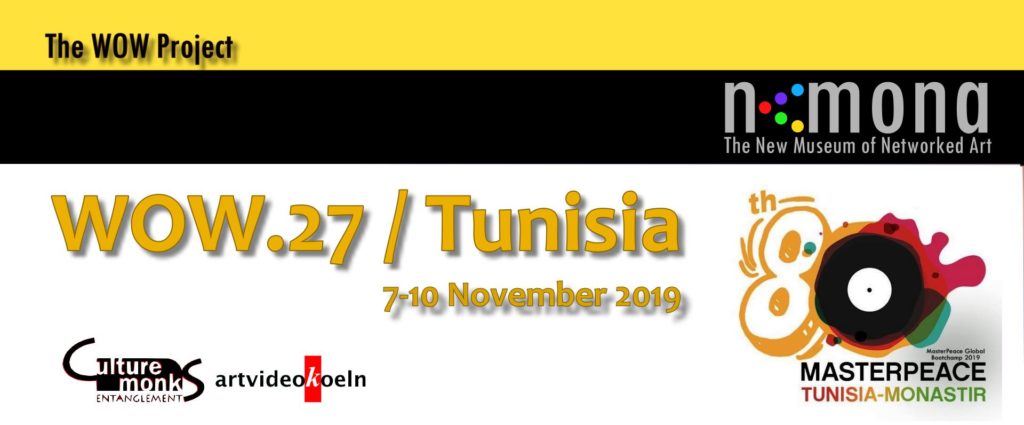
Aftermovies from Day 1 and Day 2:
MasterPeace op Instagram
MasterPeace op Facebook
Stay up to date and subscribe to our newsletter.
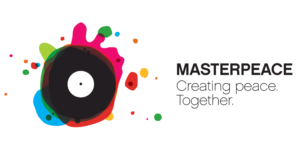
MasterPeace Bangladesh is part of the international peace movement MasterPeace.

“I Believe in MasterPeace. World leaders cannot push back armed conflict alone. We need the whole world to make this happen.”

